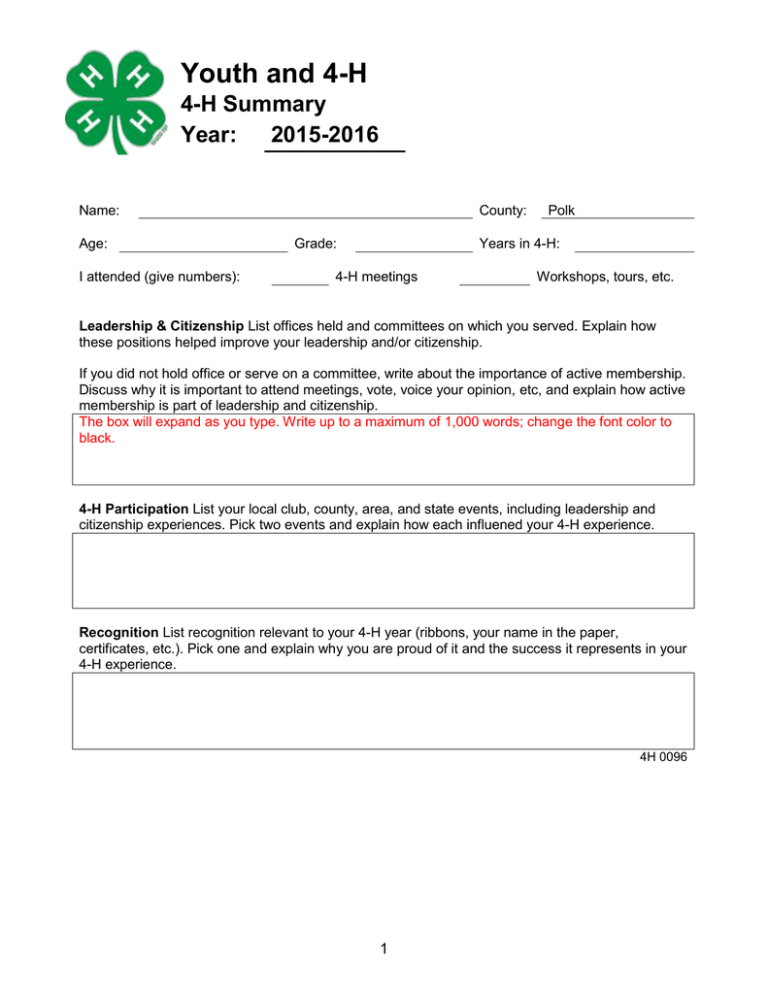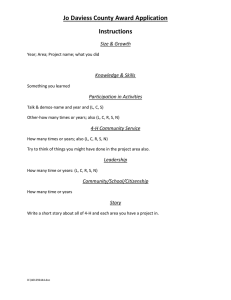Youth and 4-H 4-H Summary Year:
advertisement

Youth and 4-H 4-H Summary Year: 2015-2016 Name: Age: I attended (give numbers): County: Grade: Polk Years in 4-H: 4-H meetings Workshops, tours, etc. Leadership & Citizenship List offices held and committees on which you served. Explain how these positions helped improve your leadership and/or citizenship. If you did not hold office or serve on a committee, write about the importance of active membership. Discuss why it is important to attend meetings, vote, voice your opinion, etc, and explain how active membership is part of leadership and citizenship. The box will expand as you type. Write up to a maximum of 1,000 words; change the font color to black. 4-H Participation List your local club, county, area, and state events, including leadership and citizenship experiences. Pick two events and explain how each influened your 4-H experience. Recognition List recognition relevant to your 4-H year (ribbons, your name in the paper, certificates, etc.). Pick one and explain why you are proud of it and the success it represents in your 4-H experience. 4H 0096 1 Communication List all talks, presentations, etc. given. Pick one and explain what you learned about presenting and communication. If you did not present, what have you learned about listening? How do listeners influence the speaker? What are your future communication plans? At home with your family – What are your chores and responsibilities? Does 4-H influence how you act at home and with your family? Explain. At school In which organizations, honors, sports/activities, and offices do you participate? Discuss how 4-H influences your school choices and experience. In your community In which organizations, church, volunteer work, employment, and other activities do you participate? Discuss how 4-H influences your community involvement. … and justice for all The U.S. Department of Agriculture (USDA) prohibits discrimination in all its programs and activities on the basis of race, color, national origin, age, disability, and where applicable, sex, marital status, familial status, parental status, religion, sexual orientation, genetic information, political beliefs, reprisal, or because all or part of an individual’s income is derived from any public assistance program. (Not all prohibited bases apply to all programs.) Persons with disabilities who require alternative means for communication of program information (Braille, large print, audiotape, etc.) should contact USDA's TARGET Center at 202-720-2600 (voice and TDD). To file a complaint of discrimination, write to USDA, Director, Office of Civil Rights, 1400 Independence Avenue SW, Washington, DC 20250-9410, or call 800-795-3272 (voice) or 202-720-6382 (TDD). USDA is an equal opportunity provider and employer. Issued in furtherance of Cooperative Extension work, Acts of May 8 and June 30, 1914, in cooperation with the U.S. Department of Agriculture. Cathann A. Kress, director, Cooperative Extension Service, Iowa State University of Science and Technology, Ames, Iowa. Prepared by 1995-1997 Record Keeping Club Task Force Subcommittee; Melva L. Berkland, Extension Communication Specialist; Donna Fincham, Composition Consultant, Creative Services, Instructional Technology Center; and Lonna Nachtigal, Illustrator. Edited by Katie Beary, 2015. Polk County Youth Coordinator, Des Moines, Iowa. 2
